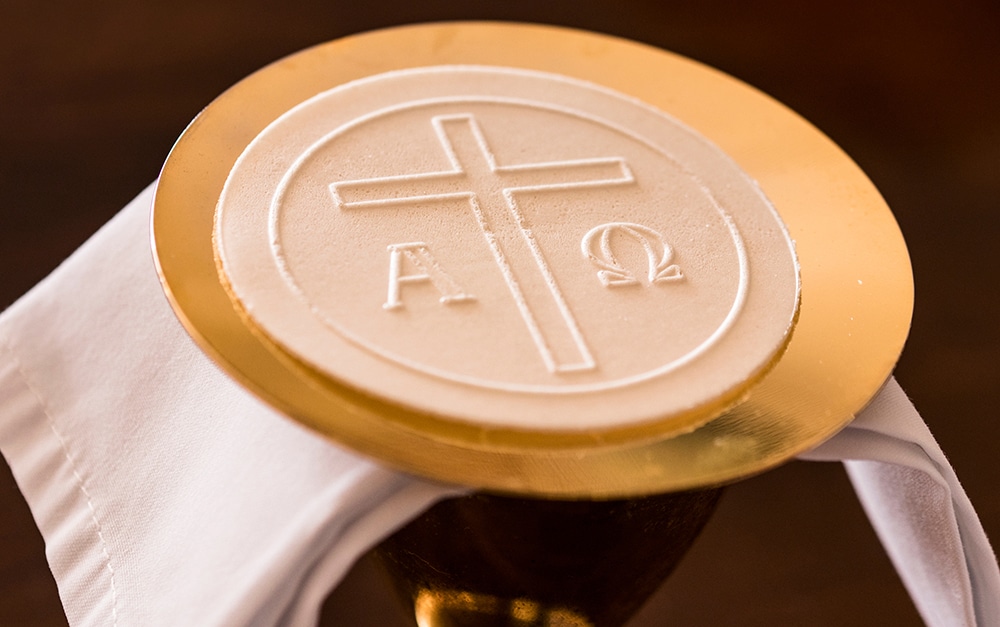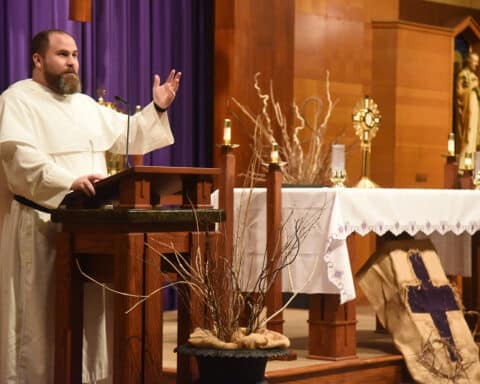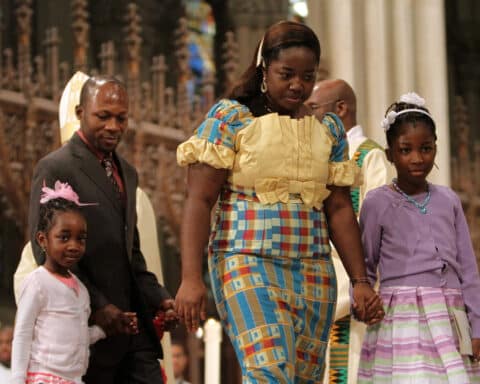Question: A retired priest who helps in our parish uses a blue chalice and paten made from either pottery or porcelain. The inside of the cup is not plated with gold. He says, all that matters is that the inner cup not be porous. What are the current norms for the materials used in sacred vessels?
— Luke Nover, LaPorte, Indiana
Answer: The chalice you describe is certainly less than desirable, if not in violation of norms. In particular, the claim that the only requirement is that the material be nonporous is incomplete. Several key documents from Rome speak to the norms for the chalice and other sacred vessels, such as the paten.
The General Instruction of the Roman Missal says: “Sacred vessels are to be made from precious metal. If they are made from metal that rusts or from a metal less precious than gold, then ordinarily they should be be gilded on the inside. In the Dioceses of the United States of America, sacred vessels may also be made from other solid materials that, according to the common estimation in each region, are precious … they are to have bowls of nonabsorbent material.” (Nos. 328-330).
The instruction Redemptionis Sacramentum from 2004 also says: “Reprobated, therefore, is any practice of using for the celebration of Mass common vessels, or others lacking in quality, or devoid of all artistic merit or which are mere containers, as also other vessels made from glass, earthenware, clay, or other materials that break easily. This norm is to be applied even as regards metals and other materials that easily rust or deteriorate” (No. 117).
Pottery is not considered by most to be precious or noble. And while porcelain may be considered by some to be noble, it is easily breakable and thus not durable. Durability is important because these vessels are to contain he who is eternal. And though no chalice can last forever, it ought to be of such durability that it lasts, and of such quality that, if damaged, one would most likely seek to have it repaired.
Prudence
Question: In a recent Gospel Jesus told a parable about a dishonest steward who was stealing from his master. At one point Jesus calls him “prudent” and seems to praise him. Can you explain?
— Marilyn Coates, Phoenix, AZ
Answer: St. Thomas Aquinas distinguishes the cardinal virtue of prudence from worldly prudence. Prudence, as a virtue, is the capacity to see and direct ourselves along the best way to our goal (salvation and heaven) given a current situation. As such, one avoids rash or foolish decisions, and methodically moves the best way toward the goal. Prudence is not caution per se, but always keeps the goal in mind.
There is however a worldly version of prudence which is directed more to worldly goals. And to the degree that these are opposed to the kingdom of God and its values, we more often use words like “cunning,” “crafty” and “devious” to signify it.
Hence the Lord, in using the term “prudent” here means this sort of worldly prudence. He goes on to lament that the children of this world are far more dedicated to their sort of prudence than are the children of light to ours.
Liturgical variances
Question: In my town there are parishes that vary tremendously in liturgical styles. I remember a day when the Mass was the same everywhere. How can we end this division?
— Name withheld, Illinois
Answer: There is a balance to be had between legitimate diversity and avoiding merely ideological divisions in liturgy. Truth be told, there has always been diversity, especially when one considers how different the Eastern rites of the Church are from the Western (Roman) rite.
Current norms in the Roman rite allow for wider diversity, but set norms that must be followed. We must remain united in essentials and charitably allow for legitimate diversity that may not always appeal to our sensibilities. Our real unity is in charity and the essential truth of the Mass not in merely external similarities.
Msgr. Charles Pope is the pastor of Holy Comforter-St. Cyprian in Washington, D.C., and writes for the Archdiocese of Washington, D.C. at blog.adw.org. Send questions to msgrpope@osv.com.






